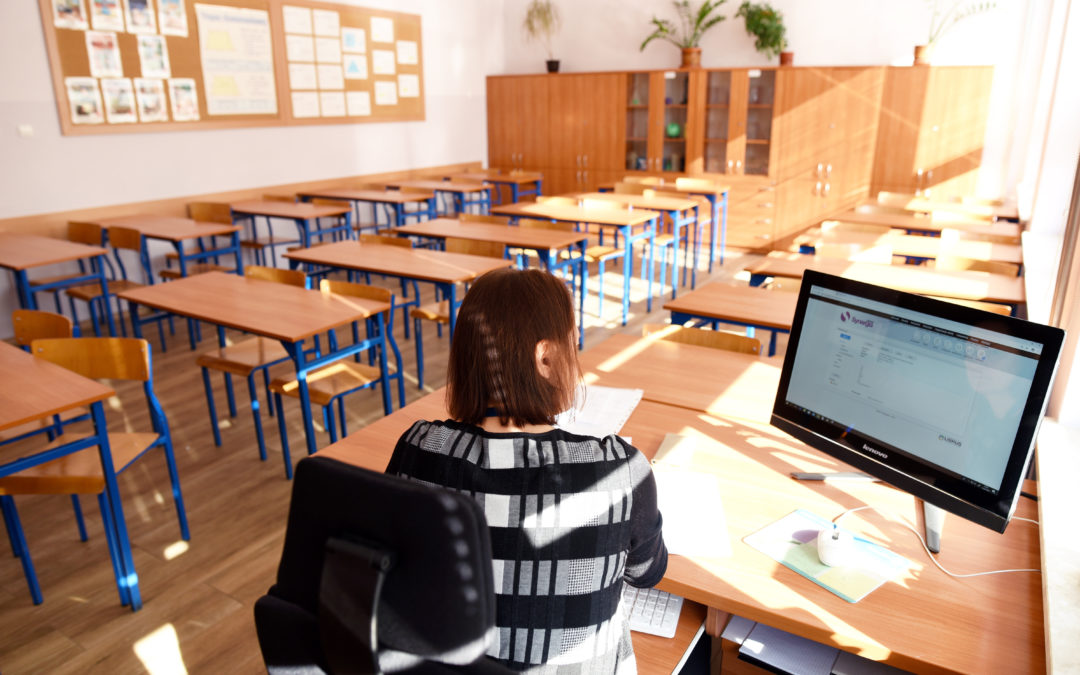As of yesterday, Polish schools – all of which are currently closed to mitigate the spread of coronavirus – are obliged by law to conduct teaching online.
Although many pupils have already been learning from home for two weeks, they continue to face a number of challenges, along with their parents, teachers, and the companies providing online learning tools.
Notice of the new regulations came last Friday, as the government introduced an official state of epidemic. It also extended the closure of schools until at least 10 April and made it compulsory for the school curriculum to be taught by distance learning.
The requirement was being introduced “so that teachers can pass on knowledge in a more systematic way, contact their pupils, and if necessary, give grades”, said education minister Dariusz Piontkowski, quoted in Rzeczpospolita.
Szkoły przeniosły zajęcia do Internetu. Jak w takim razie wygląda w praktyce nauczanie online i czy młodzież wzięła sobie do serca apele dorosłych? #Kronika #zostanwdomu #Szczecin #kwarantanna #koronawirus [wideo] ➡️https://t.co/oiJ5LNrBo7 pic.twitter.com/FXxBL5tgZC
— TVP3 Szczecin (@tvp3szczecin) March 16, 2020
Since the start of the shutdown, schools and teachers had been encouraged to continue to set work, but without introducing new material. According to Piontkowski, more than 90% of schools were using remote teaching methods, albeit not systematically.
The new Ministry of Education decree places responsibility for distance learning on the headteacher of the school, who is obliged to inform parents of how education is to be organised and to coordinate cooperation between teachers and pupils, Rzeczpospolita reports.
The increased burden has caused problems for various popular electronic platforms used by schools to communicate with pupils and parents. Librus, which claims to be used by almost half of Polish schools, was again sluggish this morning, with attachments sent by teachers proving difficult to download.
“The burden is growing day to day,” admitted Librus president Marcin Kempka, speaking to Gazeta.pl. “The increases we’re dealing with are not a few hundred, but a few thousand percent. In the last few days [we have] been the main national remote education channel.”
The Vulcan system, also used by around half of all schools, has faced similar issues. “In our system the number of internal messages increased rapidly,” company spokesman Jan Koziarski told Gazeta.pl. “Our servers deal with millions of them. We’re talking about a tenfold rise.”
Koziarski added that Vulcan was working to add new tools to respond to the demand, increasing capacity and permitting teachers to set homework directly through the system.
A podobno wszystko jest przygotowane do nauczania online. Tylko brać i uczyć…
Jak żyć Panie Ministrze @MEN_GOV_PL@D_Piontkowski ???#nauczanieonline pic.twitter.com/5Zr2VvRoRZ— Artur Sierawski (@artur_sierawski) March 25, 2020
Many teachers have also found difficulties making the sudden adaptation to a new system in which they are expected to communicate with their pupils electronically. Messages to parents have often appealed for patience and tolerance as they strive to catch up.
Onet published a letter from the daughter of a 60-year-old teacher, who has been trying to help her mother with the new challenges by telephone. “Have the authorities considered how much pressure teachers of retirement age feel? I feel sorry for my mum when I hear that she is close to tears because the situation is simply too much.”
“Pupils are being treated as guinea pigs,” the letter continued. “Teachers feel frustration at being thrown in at the deep end, without any training in distance learning, and children’s parents are doubly irritated because they have to reconcile the responsibilities of working from home with helping with homework.”
Approaches from schools so far have varied. While some have held regular classes with pupils using tools such as Zoom, the more common approach has been for teachers to send pupils assignments to work on at their own pace, and with parents’ help.
Teachers also face uncertainty over whether their current mode of work will qualify them for full payment, including bonuses, reports Dziennik Gazeta Prawna. Teachers are being encouraged to demonstrate that they are actually working every day, as opposed to being in a state of “readiness” to do so.
As a result, by also sending messages to parents, “non-blackboard” staff such as school psychologists are also covering themselves. “Now because of the ridiculous interpretation of the Ministry of Education, everyone will be sending emails to parents and pupils…because they’re afraid they’ll receive a bare wage,” one deputy head told the newspaper.
Today, the education ministry also announced that mock exams would be taking place online this year. Those for the eighth-grade pupils will take place from 30 March to 1 April, and the mock matura, Poland’s high-school graduation exam, will run from 2-8 April. The government is still planning for the proper exams, scheduled for May, to go ahead as normal.
❗️Od 2 do 8 kwietnia @CKE_PL i OKE udostępnią materiały do przeprowadzenia próbnej matury! To kolejny element wspólnych działań #CKE i MEN, aby w czasie zawieszenia zajęć w szkołach, wesprzeć dyrektorów w ich bieżących zadaniach. Więcej➡️https://t.co/EM6IilHj84 #matura #egzamin pic.twitter.com/TjNjwpPKUM
— Ministerstwo Edukacji Narodowej (@MEN_GOV_PL) March 26, 2020
The challenges caused by the coronavirus are not the first to face the current generation of pupils. A year ago, they were forced to stay at home for weeks during teachers’ strikes over pay.
Pupils have also had to contend with education reform, which a damning report by the Supreme Audit Office (NIK) last year found to have been “poorly prepared and implemented”, leaving schools overcrowded and underfunded, with conditions for learning suffering as a result.
Warsaw reports that 77% of schools are closed today, and the situation is similar around the country. It is the first such strike by teachers for over 25 years, and their unions vow they will remain off work indefinitely until their pay demands are met https://t.co/VGFzD8qtIX
— Notes from Poland ?? (@notesfrompoland) April 8, 2019
Main image credit: Robert Robaszewski/Agencja Gazeta

Ben Koschalka is a translator, lecturer, and senior editor at Notes from Poland. Originally from Britain, he has lived in Kraków since 2005.




















